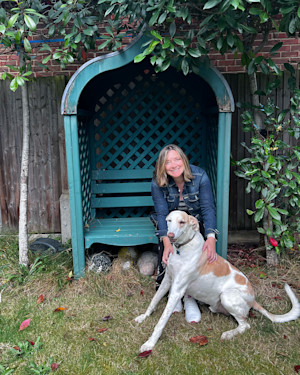Australia Wants Pet Parents to Spend 3 Hours a Day with Their Dogs
Could mandatory cuddle time become law?

Share Article
From mandatory cuddle time to breeding bans, countries are changing their laws to ensure dogs are treated with the love and respect that all pet parents know they deserve.
Proposed animal welfare lawsopens in new tab in the Australian Capital Territory (ACT) could see dog parents being legally bound to spend three hours a day minimum with their pet (sounds awful, lol). The legislation would also restrict the practice of surgical debarking (a procedure that removes part of a dog‘s vocal chord tissue to muffle the sound of their bark) and would include a recommendation against the use of retractable dog leads.
But Australia is not alone with this move. The ACT’s proposed animal welfare laws making a minimum daily contact mandatory for all dog parents – and yes, someone’s going to have to figure out how to enforce that – is part of a larger global trend to recognise animals in a more compassionate way. In the UK, the Animal Sentience Actopens in new tab – a law recognising that animals can feel joy, pain, and fear – came into force on 25 May 2023, while Denmark, France, Greece, New Zealand, and even US states such as Oregon and Washington DC have all written animal sentience into law.
But how do these laws work in practice? And how soon can we tell our bosses we have to WFH to be with our dog because the government says so? Let’s take a look at animal welfare laws around the world.
Australia
The proposed Code of Practice in Australia’s ACT covers everything from working dogs to beloved pets, and it’s pretty comprehensive, to say the least. It outlines compulsory standards all pet parents and those in charge of a dog must meet.
The draft includes:
Mandatory microchipping and sterilisation.
Bans on dog fighting, painful collars and letting dogs roam free.
Strict rules about leaving dogs in hot cars.
Requirements for proper vet care, exercise, clean bedding and 24/7 access to water.
A three-hour minimum human contact rule.
New standards for tethering working dogs and breeding restrictions.
Those failing to meet the standards of the new Code of Practice could face prosecution and the removal of the animal.
Here’s where it gets a little bit tricky. The new provisions have had a mixed response, and critics are asking some obvious questions concerning the practicality and enforceability of the proposals. How do you prove you’ve met the three-hour daily human contact rule? Are neighbours expected to report suspects?
Animal Care Australiaopens in new tab (ACA), an organisation that represents the interests of animal keepers and breeders, suggested that some of the Code is based on “animal rights ideological and/or personal bias-based opinion and not scientific or evidence-based fact”. It said that the use of and lack of definition of ‘aversive collar’ and statements relating to dog training and socialisation were ambiguous. It also criticised the mandatory three hours of human contact for all dogs. The ACA has published a full response hereopens in new tab.
When Australian woman’s lifestyle channel, Honey, polled over 500opens in new tab people on the idea, 55 percent said they weren’t in favour of governments dictating how long pet parents should spend with their dogs. Another 18 percent said ‘it depends’, while 13 percent supported the idea of governments setting minimum standards for time spent with dogs. Other commentators thought the plans would be difficult to enforce; another questioned the government’s priorities dealing with this matter while homelessness and the cost-of-living crisis went unresolved.
Switzerland
On the other side of the world, Europe has established itself as a leader in animal welfare legislation, mainly due to the European Union (EU)’s commitment to the ‘Five Freedomsopens in new tab’: freedom from hunger and thirst; freedom from discomfort; freedom from pain, injury and disease; freedom to express normal behaviour; and freedom from fear and distress. Switzerland takes it particularly seriously (and rightly so).
Their Animal Welfare Actopens in new tab protects not just the welfare, but the dignity of animals, and those that flout the rules can face a ban on keeping, breeding and handling animals commercially, or trading in animals. The also law outlines rules for keeping and breeding pets, as well as the training requirements for their humans.
They’ve also got some specific requirements, especially when it comes to social animals – for example, if you want guinea pigs, you’d better get at least two because these animals can’t be kept solo.
Germany
The German Animal Welfare Act (Tierschutzgesetz or TierSchG) is the primary federal law for animal welfare. Dog parents in Germany must register their dog with the local authorities, get them chipped and pay the ‘Hundesteuer’, essentially an annual local dog tax.
All German states require you to have a dog licence if you own a breed considered by the authorities to be ‘dangerous’ (Pit Bull Terrier, American Staffordshire Terrier, the Staffordshire Bull Terrier and the Bull Terrier). Each German state also has a list of additional dangerous dogs, some including breeds such as the Rottweiler.
Sweden
The Nordic countries also have comprehensive laws that recognise dogs as sentient beings. This belief that animals are sentient is also enshrined in EU law, through the 2009 Lisbon Treaty. Sweden’s Animal Welfare Act 2018 bans the docking of a dog’s tail and cruelty to animals, both intentionally and through gross carelessness, is an offence. Sweden’s Board of Agriculture recommends that dogs not be left alone for more than 4–6 hoursopens in new tab at a time to meet canine social and physical needs. While not following the guideline is not a criminal offence, repeated or prolonged absences could be considered neglect and an offender can be prosecuted.
Norway
In Norway, the Animal Welfare Act holds breeders accountable for practices that compromise a dog’s health and ability to behave naturally. In October 2023, the country’s Supreme Court upheld a breeding ban on the Cavalier King Charles Spaniel because of concerns over inbreeding and poor health. But the blanket ban on English Bulldog breeding was overturned in the appeals court, although its breeding is now only permitted under a supervision.
Denmark
In July 2025, Denmark introduced new dog welfare laws banning the breeding of dogs with inherited diseases and health problems. The ‘Animal Welfare Minimum Requirements for Keeping Dogs’ mean that before breeding certain dogs, appropriate health screening must be undertaken. Breeds including Bulldogs, Dachshunds and Cavalier King Charles Spaniels are affected by the law.
Both Sweden and Denmark are graded as B when it comes to animal welfare on the Animal Protection Indexopens in new tab, as is the UK.
United Kingdom
The UK prides itself on being a nation of animal lovers and can lay claim to some strong legislation and a progressive history, with Cruelty to Animals Acts evoked as early as the 19th century. More recently, the UK’s Animal Sentience Act 2022 recognised animals as beings capable of feeling.
However, in May 2025, the Centre for Animals & Social Justiceopens in new tab said that the UK Government has never carried out any systematic, comprehensive audit of animal welfare standards in the UK, or compared findings with other countries. The comment was in response to an MP’s claim that UK farmers produce the best food in the world to the highest animal welfare standards. Is the UK law surrounding the welfare of pets a global gold standard?
Lucy’s Lawopens in new tab came into effect in England in April 2020. It bans the sale of puppies and kittens under six months old by third-party sellers and pet shops in the UK. The aim of the law is to raise breeding standards and clamp down on low-welfare and high-volume puppy farmers and the abuse of the EU Pet Travel Scheme. May 2024 also saw the introduction of the Pet Abduction Bill, which recognised cats and dogs as more than just property, and made taking a dog or cat without consent a specific criminal offence punishable by up to five years in prison or a fine.
The public have responded positively to the stricter pet laws, a Public Consultationopens in new tab showed over 95 percent supported the ban on third-party sellers that Lucy’s Law outlawed. Evidence from the Pet Theft Taskforceopens in new tab said that around 2,000 dog theft and over 400 cat theft crimes were reported to police in 2020, causing distress for pet parents and their pets, and that pet theft was a major concern to the public.
Family barrister Christine Warner has direct experience of how UK dog welfare law is progressing. She founded the Ruby’s Law campaignopens in new tab, which aims to put measures in place to protect pets in domestic abuse situations. “I’m optimistic about the UK’s approach to dog welfare because there is growing recognition that dogs are sentient beings, not just property,” she says. “Recent legislation, like Lucy’s Law and strengthened protections against pet theft, puts us ahead of many countries, though there’s still more to do to ensure enforcement and consistency across the board. With continued focus, the UK could become a world leader in dog welfare law.”
Christine agrees that the UK is making real strides in dog welfare, with strong legislation but says there is work to done in areas like companion animal guardianship and anti-cruelty enforcement.
“Ruby’s Law has highlighted how much more work is needed to protect pets as part of the family unit. While UK law is moving in the right direction, there’s still a gap in ensuring pets are considered in domestic abuse and family law contexts. Addressing this would set the UK apart internationally,” she says.
“Real leadership will come when the recognition that pets are sentient beings results in their welfare being a legal priority, not an afterthought.”
The global trend for stricter pet laws
Many countries across the world now recognise animal sentience and base corresponding pet welfare laws on that. Pet ownership is on the rise globallyopens in new tab too, with estimates putting the figure of global pets at over a billion, with more than half the world likely to have a pet at home. There is now also an understanding that a positive relationship with a companion animal can help the physical and mental health of the humans that care for and enjoy it. As the world experiences a growing middle class, with disposable income, and sees more couples choosing to have children later, or not at all, pets are becoming more important in society.
Greater respect for animal sentience, coupled with increasing numbers of pets occupying the same space, means that stricter codes of conduct must be decided upon to ensure harmony. It also means there are economic opportunities to both provide those pets and provide services for them, necessitating greater breeding regulation and laws surrounding appropriate care.
The future importation and movement of pets will come under greater scrutiny, as will the rights of an owner to access a pet whether they live in rented accommodation or own their home. Increasingly, unhealthy and extreme conformations in certain breeds, including flat faced, or brachycephalic, cats and dogs, are being criticised, with some complete breeding bans in place already. The same level of scrutiny is being applied to the mutilation of pets for cosmetic purposes, such as ear cropping.
The future of pet laws
The UK is also likely to introduce laws that follow the global trend of higher animal welfare standards. There are currently many active campaigns with strong public support including regulation for animal rescues, a ban on greyhound racing, better protection for cats on roads, protecting pets from domestic abuse, more control over firework zones that restrict the private use of fireworks and the reversal of the XL Bully ban.
Despite some stringent laws existing in the UK today, it seems there’s still plenty of work to be done – and the public desire to see its success.
Resources
“Animal Welfare Act 1992 | Actsopens in new tab.” ACT Legislation Register.
“Domestic Animals Act 2000 | Actsopens in new tab.” ACT Legislation Register.
Department for Environment, Food & Rural Affairs, “Pet Theft Taskforce Report.opens in new tab” gov.uk, 2 Sept. 2021.
“HealthforAnimalsGlobal Trends in the Pet Populationopens in new tab.” HealthforAnimals, 28 Jan. 2022.
Kotzmann, Jane S. “Recognising the Sentience of Animals in Law: A Justification and Framework for Australian States and Territories.opens in new tab” WBI Studies Repository, 2020.
Tugwell, James, and Elizabeth Byrne. “Dog Owners Must Spend Three Hours Minimum with Pet under ACT’s Proposed Animal Welfare Laws.opens in new tab” Abc.net.au, ABC News, 6 July 2025.
“Sweden Animal Welfare.opens in new tab” Lansstyrelsen.se, 2024.
“Norway Animal Welfare Act.opens in new tab” Regjeringen.no, 2025.
“Germany Animal Welfare Law.opens in new tab” Deutscher Tierschutzbund E.V., 2024.
“Danish Legislation on Dogs.opens in new tab” Foedevarestyrelsen.dk, 2019
Federal Food Safety and Veterinary Office. “Switzerland Animal Welfare.opens in new tab” Www.blv.admin.ch.
“UK Animal Welfare (Sentience) Act 2022.opens in new tab” Legislation.gov.uk, 2022, .
“TierSchG - Tierschutzgesetz.opens in new tab” Www.gesetze-Im-Internet.de.

Vanessa Holburn
Vanessa Holburn is a journalist whose work has featured in The Telegraph, The Express and The Mirror, as well as Wunderdog, Dogs Today, Bella and Fabulous magazines. She is also the author of How To Pick A Puppyopens in new tab and was part of the successful #LucysLaw campaignopens in new tab that banned puppies from being sold in pet shops. She’s a dog mum to Ziggy, a sofa-loving rescued Lurcher and they are both owned by two tabby cats, Lollipop and Jelly Bean.
Related articles
![a woman with curly red hair hugs her cat tight]()
The Pet Abduction Bill Is One Step Closer to Becoming Law
Right now if your pet is stolen, the government treats it as property theft, instead of the loss of a valued family member
![]()
No More Pet Bans: Renters’ Rights Bill Passes Final Hurdle Before Becoming Law
How the new law will revolutionise renting with pets
![Grey XL Bully looking up at camera]()
How to Protect Your XL Bully Under the New Ban
How to keep your dog happy and healthy under the new legislation






